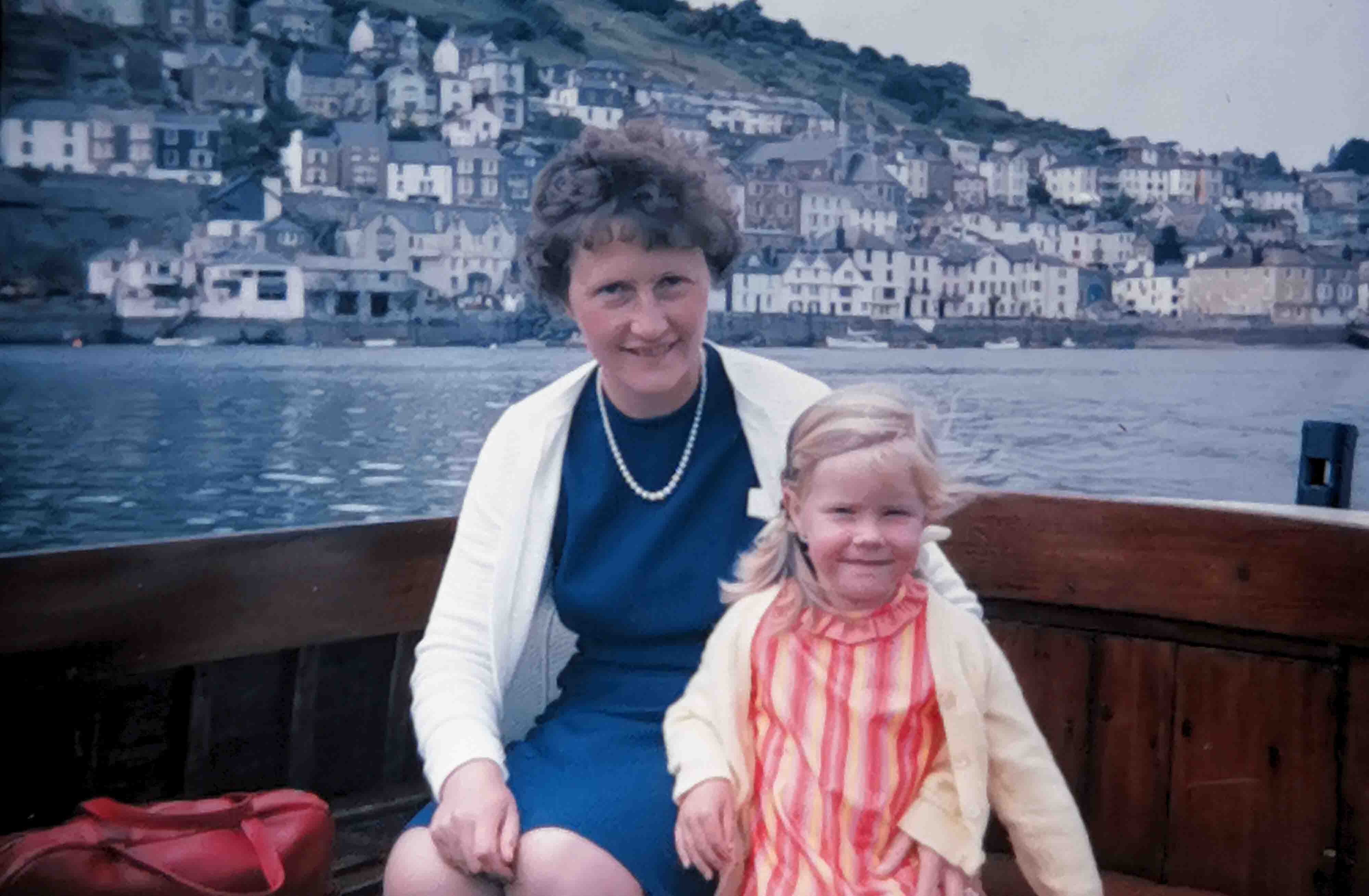Once upon a time,
Our Unity was the most famous charter boat in the British Isles. It was synonymous with mighty hauls of cod, coalfish, ling and of course Conger. The catches it consistently produced for anglers in the 1960s and 1970s seemed more akin to commercial fishing than rod and line. It was not just the quantity either. If you dreamed of taking a British record for cod, conger, coalfish or pollack,
Our Unity was the boat to do it on. Every sea angler had a vision of leaving the Brixham, South Devon, port that was its base, and reaping the harvest that awaited them on dozens of wartime wrecks littering the Channel between England and France.
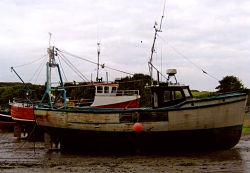
Fast forward to Christmas 2005. I had taken a weekend break in North Devon to get a breath of sea air and maybe cast a line. Wandering around Watermouth harbour near Ilfracombe, I noticed a blue and white boat that seemed vaguely familiar, lying on its side in the sand. It was in a sorry state, showing signs of storm damage; rot and rust were everywhere. The hatch covers were gone, many of the electrics had been stripped, windows were smashed and the starboard rib was badly cracked. I made a closer inspection - and realised why the outline was so familiar.Across the front of the wheelhouse and the stern, still legible despite the boats sorry state, was its name and home port;
Our Unity, Brixham. It took me back more than 30 years, to the days when I was a student and wondered how I could manipulate my grant to tread its hallowed decks and battle mighty conger.
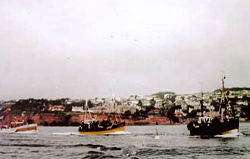 Our Unity
Our Unity (registered as BM 96) was one of a group of fishing charters that operated out of Brixham. This included
Koh-i-Nor (BM 35),
Breadwinner (BM 37) and
Anne Marie (BM 178), all of which acquired a small level of fame on the back of
Our Unity's success, skipperd by Ernie Passmore and John Trust.
The certificate of registration shows that
Our Unity was built by S H Shears of Brixham in 1960, although one former skipper owner insists that she was built in nearby Galmpton on the River Dart, a centre for boatbuilding for more than 150 years, by Ralph Hooper and Sons. She weighed 12 tons and was a member of the Brixham fishing fleet, trawling the once-prolific grounds of the south west English coast in the winter and taking anglers wreck fishing in the summer.
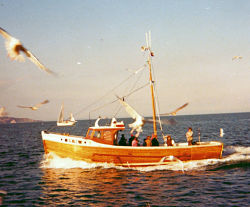
In November 1969, her Gardner diesel engine was upgraded, making her capable of 9.4 knots (quite a speed in those days) which enabled the boat to reach distant wrecks in the Channel more quickly. Passmore and Trust kept the boat immaculately (not a state generally associated with fishing boats) and the hull was always well varnished. They were rightly proud of her. They were also very early users of Decca, realising the benefits it offered a boat like theirs, despite the rental cost of £900 per year.
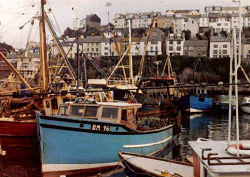
Between 1966 and 1974, the duo revolutionised wreck fishing in the south west. They brought more than 80 TONS of conger alone into Brixham Fish Market in those 9 years- and that is the gutted weight. On top of this, there were tons of other fish such as cod, ling and coalfish, and they did this just by fishing from late May to early October.
Trust and Passmore wee the first to exploit the big wartime wrecks like the 380ft
Empress of India battleship in the area around Lyme Bay. They drifted or anchored over these wrecks, using artificial eels or fish strips. despite tides only allowing a maximum of four hours fishing, catches over 200lb were often recorded. One of the best was 2864lb taken on just three hours. Week after week in the angling press,
Our Unity dominated the headlines with outstanding catches and record fish.
The skippers were keen supporters of the British Conger Club and Our Unity held the club's Boat of the Year award every year between 1966 and 1974. there was even a plaque mounted on the wheelhouse, presented for "invaluable service to anglers" by the House of Commons Sport and Social club.
Novices or experienced; it didn't matter to
Our Unity. All it required from anglers was that they had good sea legs (the English Channel, with its long rolling seas is notoriously tough on those who suffer from mal de mer) and plenty of stamina to heave those conger up from 45 fathoms or more.
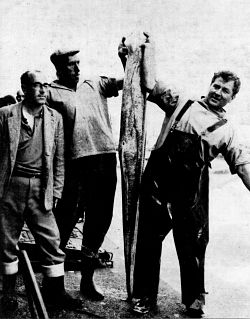
Typical was George Martin, a retired bookie from Northwood, Middlesex, who caught his first cod when he was persuaded by a friend to go out on
Our Unity in June 1972 rather than play golf. Caught on borrowed tackle, the fish weighed 53lb and set a new British record. John Trust broke the coalfish record himself with a fish of 26.5lb, also in 1972.
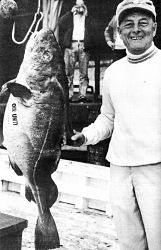
Colin Chapman from Southampton, Hampshire, caught an 85lb conger in June 1973. This broke the previous record of 84lb, which had been held by H A Kelly for 37 years. A month later, Cardiff steelworker Billy oaten was actually disappointed when he landed a world record 96lb 4oz conger in August 1973 from
Our Unity. He had hoped that he would be the first angler to catch an eel over 100lb, and claimed that the fish would have broken that mark had it been weighed immediately.
The boat became a celebrity that attracted celebrities. For example, the late world snooker champion Joe Davis remembers witnessing that record conger on his only trip out deep-sea fishing. Dr. David Solomon, now a world authority on salmonoids, recalled fishing from
Our Unity at every opportunity when he was at university in Exeter.
"It was bigger than most of the charter boats, and was always rigged for trawling, but it was very comfortable to fish from. They would go out in most conditions because if they didn't go out, they didn't make money. They would take ten anglers at a time and sometimes would be sailing for three hours, fish for a couple and come back. The best fishing was always on slack tides. On my best day we had about 700lb of fish. I had one conger of 61lb and three of more than 40lb."
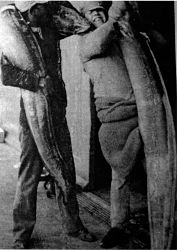
He remembers Trust as the tall one, Passmore was the short one, but said: "They were both very personable. They were usually both on the boat together and worked very hard for you."
That was understandable. Solomon recalls that anglers were allowed to keep just two fish and the boat took the rest. These were sold to Brixham Fish Market. "Anglers didn't want to keep conger in those days, so they took them all. Anything under 10lb went back."
Our Unity never recorded that 100lb conger, though it certainly lost several that would have done so.The British and world record is now 133lb 4oz. That fish was caught, ironically, off south east Devon on one of the wrecks that
Our Unity used to fish, but Passmore and Trust, who were given honorary life membership of the European Federation of Sea Angling for their achievements, pointed the way for the few who have managed the feat since.
The duo retired in the mid 1970's, and that was really the end of the golden days. Passmore sadly drowned in Cyprus in 1990 and Trust gave up fishing.
Our Unity than passed through several owners, none of whom owned the boat for any length of time.
In November 1980, she was owned and operated as a fishing vessel by Dennis Northway of Brixham, followed by Pauline Kimble of Brixham from May 1984; Colin Pavey and Robin Blues of Weymouth took it on from April 1985 and John Dear of Brixham from September 1988. In 1994, the boat was bought by John Penfold. His previous boat,
Foina May, had been sold to Maurice Woodger of Ilfracombe, North Devon. However, John found that
Our Unity was not as good for net wrecking as
Fiona May. Penfold and Woodger did a deal under which John sold
Our Unity to Maurice for £1 plus the return of
Fiona May.
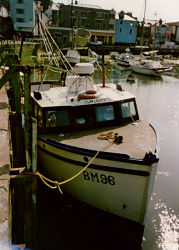
From 1995, Woodger operated
Our Unity out of Ilfracombe for several years. she was licensed for 12 passengers and two crew. Woodger mainly used the boat as a dive-support vessel, taking parties of divers out to Lundy Island during the week and carrying parties of anglers at weekends.
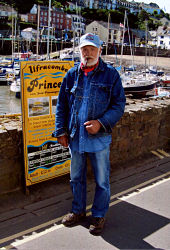
On many occasions, he said anglers recognised the boat, and recalling the heady days of her prime, insisted on being taken out to experience the history, or in the hope of reliving those glory days. but conger eels don't run anything like as big off the North Devon coast, because the wrecks have been largely destroyed by chain drags. Anglers still caught plenty of bass, smaller conger, blonde rays, thornback 'skate' and pollack. But this was small fry compared to those days of monsters, and plenty of other venues could now boast similar sport.
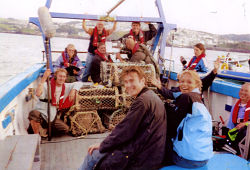
Under Woodger,
Our Unity was also used in the BBC TV series
Down to Earth starring Warren Clarke and Pauline Quirk. Woodger still keeps a photograph of two of the other stars, Ian Kelsey and Angela Griffin with the film crew aboard his boat. Even today,
Our Unity still features on picturesque postcards of Ilfracombe sold in the town.
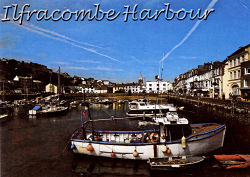
On one occasion, the boat was damaged by a signpost set in a concrete base, thrown from the pier into the harbour. As Woodger steered into the harbour, the pole pierced the hull. He just managed to get the boat back to the quay, but had to enlist the fire brigade's help to pump her out. The Gardner engine was removed and restored while repairs were carried out on the hull.
When Woodger retired in 2000,
Our Unity was sold again, but this proved a disaster. The new owner had a number of accidents in Ilfracombe harbour, and was told to move her to nearby Watermouth Bay harbour, where she was thrown against the rocks and badly damaged in a storm.
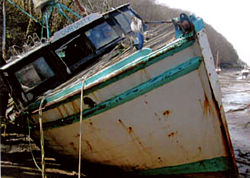
After this incident, the boat was sold again to John Gillard, who planned to repair her and run charters again. However, serious illness prevented him from carrying out the work at a pace that could reverse the decline in the boat's fabric. Further storm damage, vandalism and neglect took their toll. Eventually,
Our Unity was keeled over onto its side. It was clear the decline was terminal. Woodger saw his old boat in this sorry state. He said it made him weep to see how it had deteriorated.
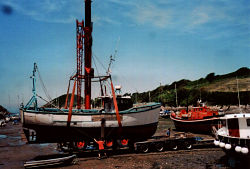
Last year, a crane lifted
Our Unity out of Watermouth Bay harbour. It was lifted onto a lowloader, to be towed away and broken up. The wheelhouse plaque had been removed and passed to one of Passmore's sons, Woodger still has pieces in his garage, sad reminders of the boat that accounted for some of Britain's greatest sea angling and started a revolution in wreck fishing. Trust died aged 73 in 2004. Passmore is succeeded by four sons and one daughter, one recently retired as a trawlerman on the South Devon coast, but their legacy lives on.
This article was written by Reg Talbot (Trustee) and Keith Armishaw for
Classic Angling magazine, featuring in the July/August 2010 issue. Thanks also to Editor, Keith Elliott for his work in enhancing it prior to printing.
Please note! There were errors in the original text regarding Ernie's death and family which have now been corrected with the help of his daughter Deborah. We apologise for this error in the original article and any upset this may have caused.
Since this was included on the AH website we were contacted by the person photographed as a young lady on the boat. She told us of family holidays in Devon which always included her father having a thoroughly enjoyable trips on Our Unity and sent these pictures which I think embellish the tale above. Sadly, our computer died and we have lost her details but we would very much like to address this failing if she could contact us again.
Brixham
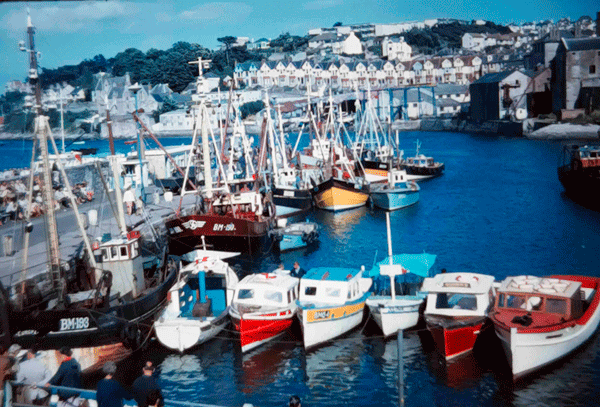
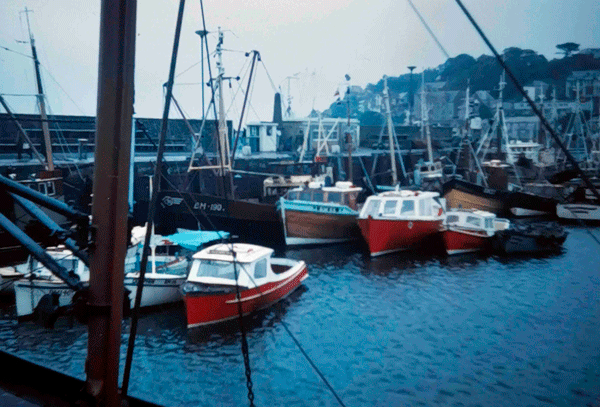
Dad with a conger
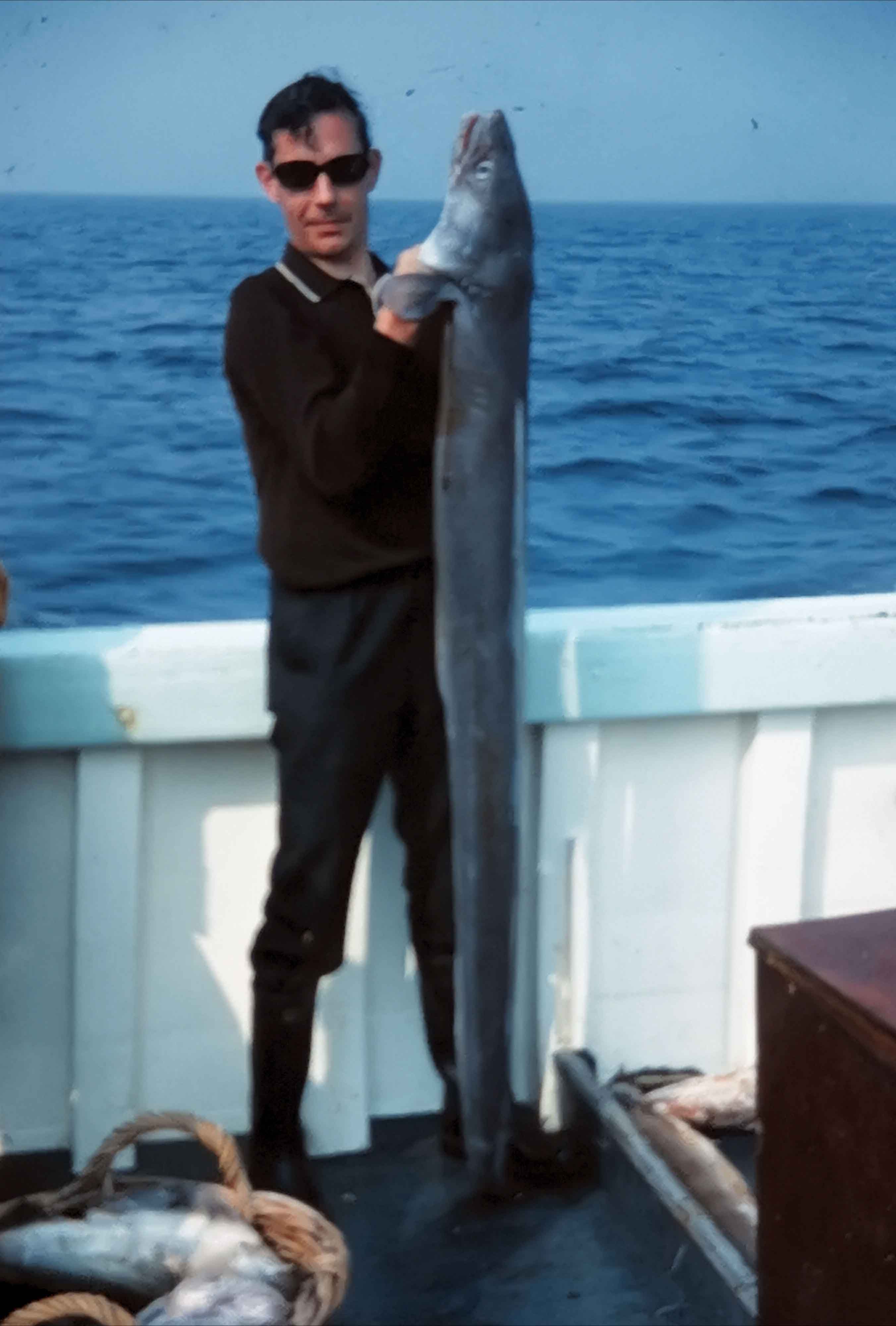
A 62lb conger being weighed
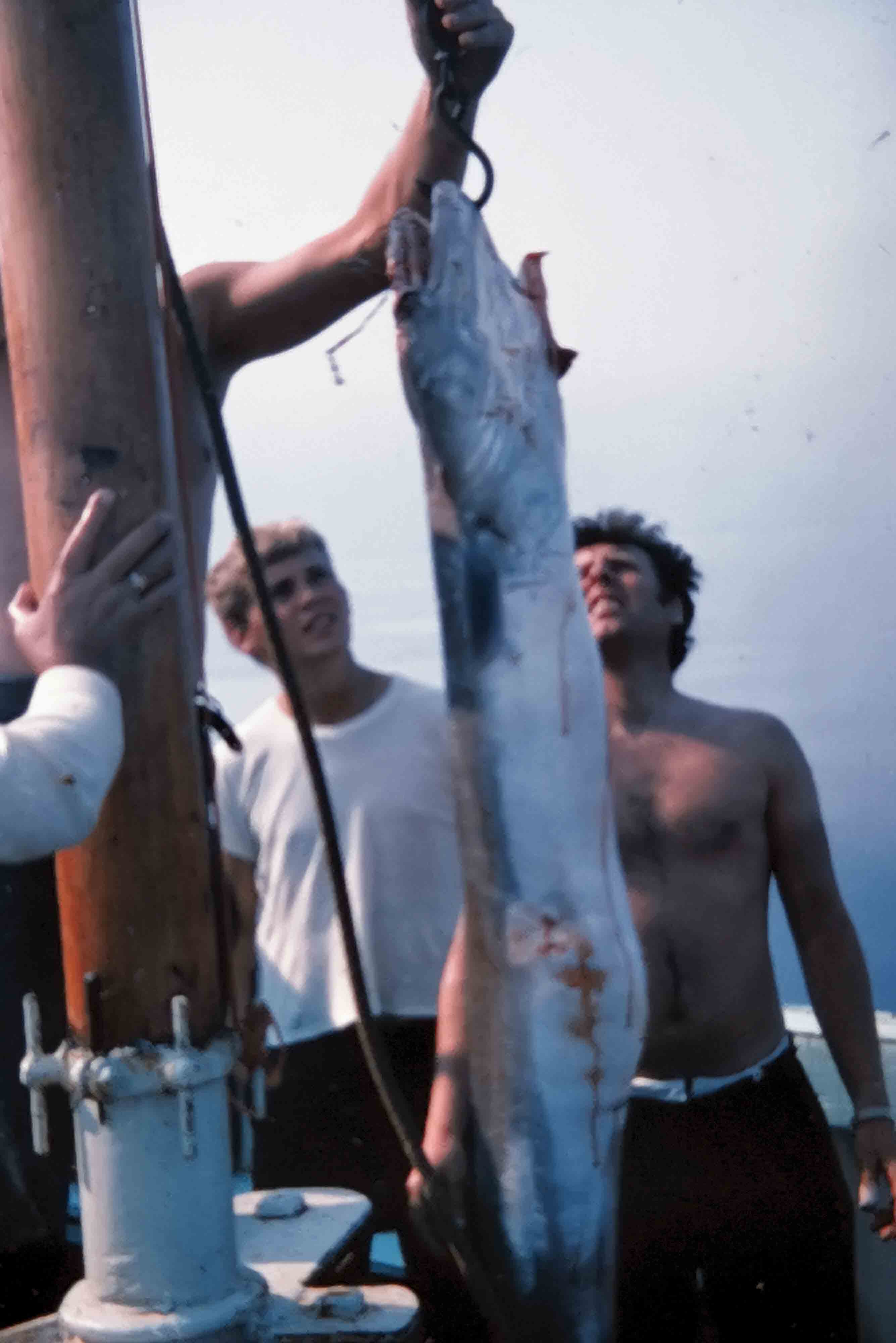
An 11lb pollack
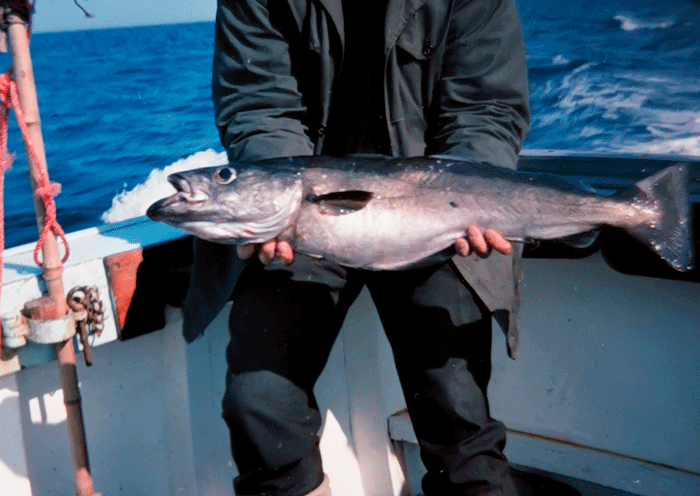
Graham Hand with a turbot
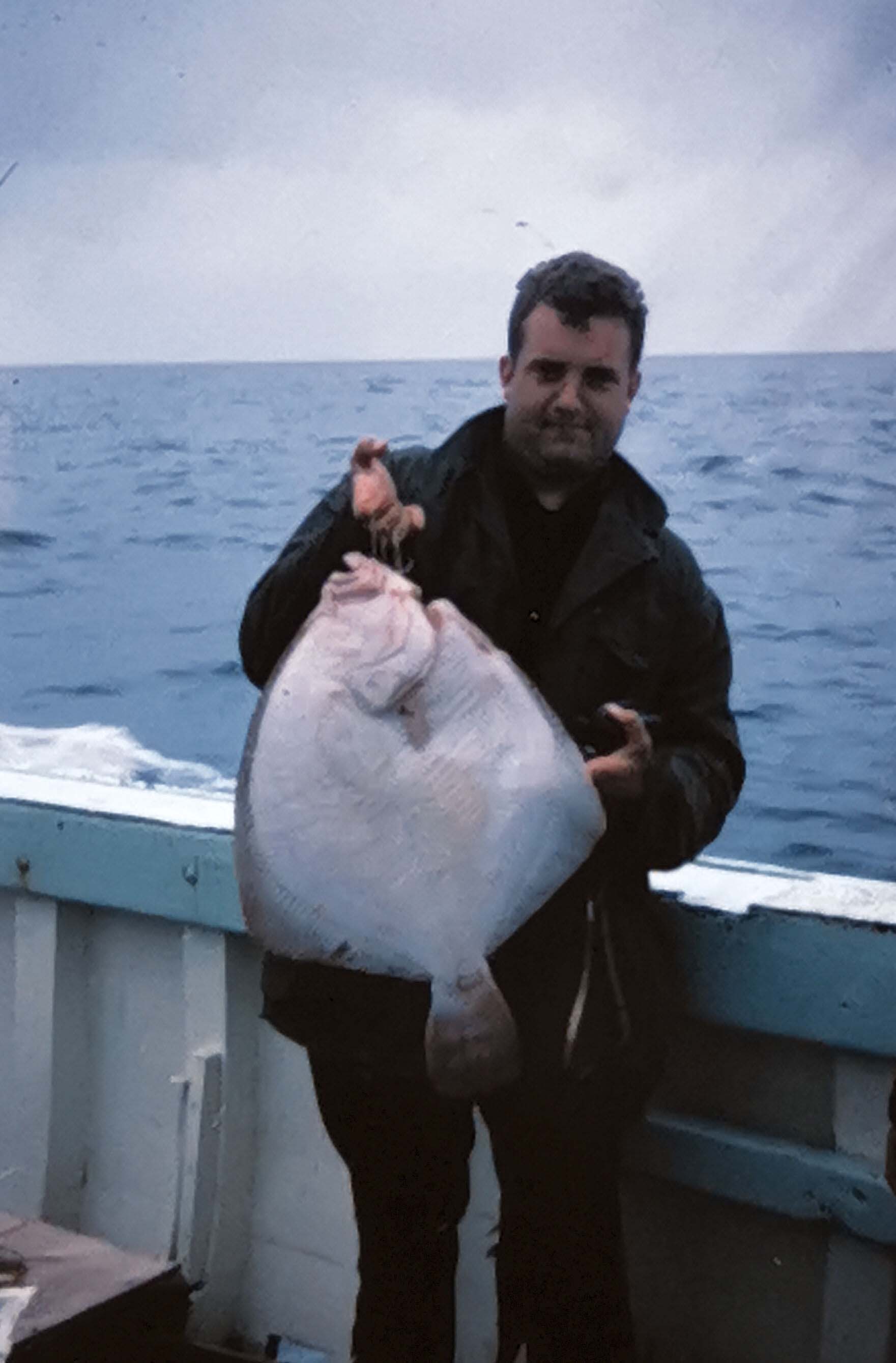
Finally, the lady who sent the pictures with her mother, happy memories
